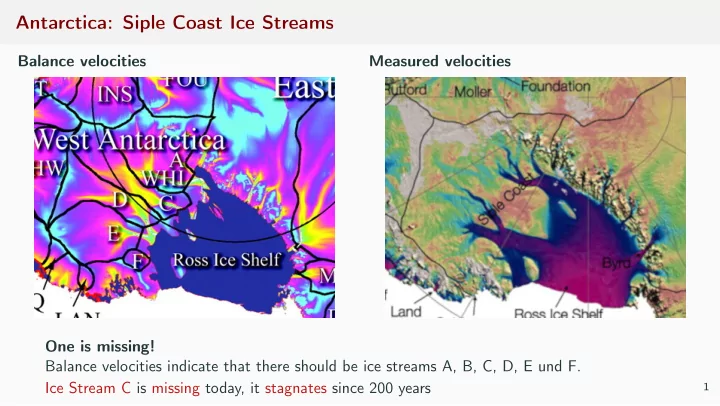

Antarctica: Siple Coast Ice Streams Balance velocities Measured velocities One is missing! Balance velocities indicate that there should be ice streams A, B, C, D, E und F. Ice Stream C is missing today, it stagnates since 200 years 1
Siple Coast Ice Streams 2 USGS
Siple Coast Ice Streams: Ice Flow und grounding lines 3 Thomas (2013)
Antarctic Ice Stream Geometries: Longitudial Sections and Stresses Whillans Whillans Whillans 4 Bennet (2003)
Geothermal Heat Flux as Source of Melt Water? 5 Winsborrow (2010) Talalay (2020)
Extremely Soft Subglacial Sediments Properties of sediments • extremely low strength τ f ( yield stress ) • sediments are water-saturated → high porosity • high water pressure p w → low effective pressure N = p o − p w • τ f = µ N + c 0 τ f = 0 . 443 N + 1 . 3 kPa • for comparison: pressure of a human 100 kg · 9 . 81 m s − 2 ≃ 20 kPa 0 . 05 m 2 6 Tulaczyk (2001)
Whillans: Flow Velocities 7 Haselhoff (2019)
Whillans: Shear Margins 8 Meyer (2018)
Crevassing in Marginal Shear Zones 9 C. Larson
High Ice Deformation in Marginal Shear Zones Marginal shear zones • velocity changes rapidly across marginal shear zones • in models the ice has to be 10 times softer (enhancement E ) • effect of crevasses and strain heating • feedback: faster motion leads to softer ice • sideways migration of shear margins is possible 10 K. Echelmeyer
Whillans: Thermal Softening in Shear Margins 11 Perol (2015)
Whillans: Thermal Softening in Shear Margins 12 Haselhoff (2019)
Whillans (Ice Stream B): Stick-Slip Motion Stick-slip motion • the Ice-Plain ( ∼ half Switzerland) moves only episodically • usually two motion events per day • motion distance about 40 cm • clear influence of ocean tides 13 Bindschadler (2003)
Whillans: Stick-Slip Events Timing of events • triggering of slip-events by ocean tides • usually two events per tidal cycle • 14-day cycle like tides 14 Winberry (2008)
Whillans: Stick-Slip Motion Event : Animation 15 Wiens (2008) Winberry (2009)
Whillans: Stick-Slip Motion Events • episodic motion controlled by tides • mostly at rising or falling tide level • similar repetitions 16 Winberry (2013)
Whillans: Explanation of Stick-Slip Motion • ice stream is compressing the "stick-slip region" in longitudinal direction • the elastic stress ¯ τ upstream is increasing • tides modulate the stress ¯ τ tide (right) • if stress ¯ τ b is larger than a critical value → motion event 17 Winberry (2013)
Whillans: Stick-Slip Motion Events 18 Winberry (2014)
Whillans: Stick-Slip Slow-Down 19 Winberry (2014)
Whillans: Ice Flow Velocities 20 Thomas (2013)
Whillans: Slow-Down Measurements • marked slow-down of ice streams A and B (Mercer/Whillans) • stagnation of ice stream C (Kamb) • unclear for ice streams D and E (Bindschadler/MacAyeal) 21 Thomas (2013)
Whillans: Slow-Down Measurements 22 Thomas (2013)
Whillans: Slow-Down Measurements 23 Beem (2014)
Siple Coast: Water Fluxes and Subglacial Lakes 24 Carter (2013)
Siple Coast: Basal Topography 25 Catania (2012)
Siple Coast: Changing Ice Fluxes 26 Catania (2012)
Siple Coast Ice Streams: Hypotheses Causes for shutdown of Kamb Ice Stream (C) • water piracy: Whillans (B) reroutes melt water • sediment under Kamb consolidates → less deformation • less heat production → less water → less deformation Causes for slow-down of Whillans Ice Stream (B) • melt water is increasingly routed towards Kamb (C) • potential re-activation of Kamb • after long time a stagnation of Whillans (B) is possible 27
Whillans Slow-Down: Modeling of Future 28 Bougamont (2015)
Recommend
More recommend